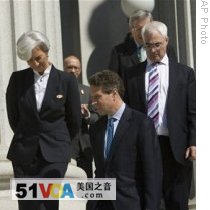Washington
24 April 2009
 |
| US Treasury Secretary Timothy Geithner (bottom, center) leads a group of G7 finance ministers to a photo session in Washington, 24 Apr 2009 |
Officials are hopeful that they see signs that the dramatic downturn in the world economy is bottoming out. But IMF deputy managing director John Lipsky warns that the decline is likely to continue for several more months. "Already it (world output) has been contracting at the fastest rate since World War II. And there are still downside risks," he said.
At their summit in London in early April, leaders of the Group of 20 advanced and developing economies promised to take all measures necessary to halt the economic decline. They pledged more resources to the IMF to help countries in distress and promised to avoid restrictions on trade.
Since the financial crisis began in the United States (in 2007), US officials are under pressure to assure their counterparts that they are taking decisive action to safeguard and repair the banking system. But IMF official Marek Belka says Europe also must clean up its banking system. "Europe still needs to act more forcefully to restore financial confidence. This requires recognizing losses in a forward looking way," he said.
Finance ministers from both the seven richest industrial countries and the Group of 20 were holding separate sessions on Friday. In between the meetings, U.S. Treasury Secretary Timothy Geithner said all financial meetings over the next few months will have the same agenda. "And the agenda will be: what are we doing? Are we doing enough to help attenuate the risks in this recession, to lay the foundation for earlier recovery and a set of reforms that leave the system stronger in the future," he said.
World Bank chief economist Justin Lin says the global slowdown has prevented up to 90 million people from moving out of poverty. Even more people, he says, are still suffering from the increase in food and fuel prices one year ago. "And because of that about 100 million people were still trapped in poverty because of higher food and fuel prices," he said.
On Saturday the finance ministers discuss IMF global operations and on Sunday they set a policy agenda for the anti-poverty programs of the World Bank. Both institutions are owned by their over 185 member nations.